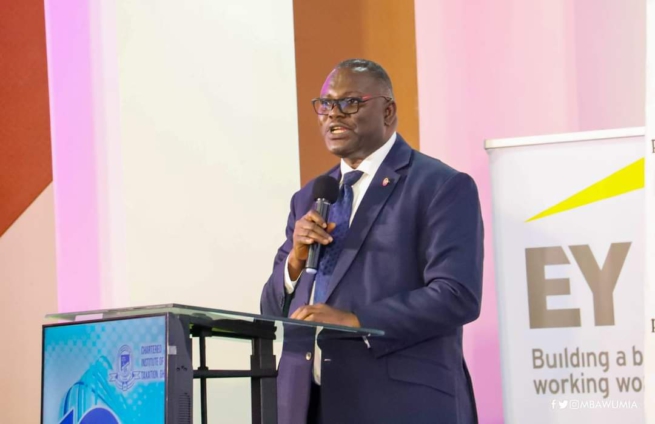
Audio By Carbonatix
Dr Abdallah Ali-Nakyea, a tax expert, says the ever-widening gap seen in our revenue mobilisation process can be successfully closed by intensifying our current revenue mobilisation measures and policies.
The senior lecturer at the University of Ghana School of Law believes this will "rake in the needed revenue to support our expenditure as a country while paying off incurred debt, and not the introduction of new taxes.”
He said this at the just-ended 10th Annual International Tax Conference in Accra.
Speaking as the keynote speaker at the Conference organised by the Chartered Institute of Taxation, Ghana, he said, guaranteeing efficiency and effectiveness in mobilising existing taxes will close the ever-widening tax gap, thereby ensuring that new taxes introduced to bring in the projected revenue with little or no losses.
“In Ghana, our revenue mobilization challenges do not stem from low tax rates, but rather the tax losses we are incurring. Those required to pay the required taxes cannot be found, that is exactly where our challenge is. Therefore, the problem we need to address to increase revenue mobilization in Ghana is how to close the tax gap.”
The 3-day conference was themed Improving Domestic Tax Revenue Mobilization: A Consultative and Inclusive Approach. Participants discussed ideas on Taxation and its related subjects with the aim of crafting and developing solutions to problems and challenges facing businesses and the nation. It was also a platform to arm participants with beneficial taxation skills.
Dr Ali-Nakyea maintained that a key component needed to ensure the successive closure of the tax gap in Ghana is data, which he said could be achieved through the reliance on digitalisation in capturing the required information on tax-paying citizens in the country.
“Through the efforts of the Ghana Revenue Authority, the government has been able to acquire a substantial number of potential taxpayers, it is now left to us to mine the data to get a clear understanding of the tax paying atmosphere in Ghana and ensure that taxpayers uphold their constitutional duty to the country,” he said.
Research indicates that challenges that form the basis of the ever-widening tax gap include low voluntary tax compliance, a narrow tax base, poor stakeholder perception of the tax system, owing to the lack of consultation and inclusiveness, and gaps in institutional capacity for revenue mobilization.
In order to address these challenges, Dr Ali-Nakyea advised government to continue with its strategies aimed at broadening the tax net through the strengthening of taxpayer registration, taxation of the informal sector, reviewing of policy and legislation, as well as upscaling their business intelligence and analysis skills to trace and track illicit financial flows.
He also stated that to successfully execute strategies aimed at closing the tax gap in terms of revenue mobilisation, the government should ensure that citizens are well informed on taxation issues to improve their perception of the issue while strengthening voluntary tax compliance through an improved tax refund system, award systems for compliant taxpayers, publishing tax rulings, regular tax audits and improving taxpayer services and experience.
Dr Ali-Nakyea urged the government to create an enabling environment for all stakeholders to collectively play their part in the revenue mobilisation process saying “It is time CSOs got involved with improving tax administration in the country.
"As a matter of fact, CSOs are located within communities and they can help to articulate the views of the local citizenry on the issue of taxation.
"Government as a matter of urgency must promote co-ordination, harmonisation and ownership of the development process with regards to improving domestic tax revenue.”
The Chartered Institute of Taxation, Ghana is a statutory body established by the Chartered Institute of Taxation Act 2016 (Act 916).
The objective of the Institute is to promote the study of taxation and regulation of the practice of taxation in Ghana.
The Chartered Institute of Taxation, Ghana has been operating as a professional body since 1978 and was formally incorporated under the Companies Code 1963 (Act 179) as Ghana Institute of Taxation on May 2, 1980.
Latest Stories
-
‘NDC can’t change the constitution alone’ – Minority MPs hold key role, says Barker-Vormawor
6 minutes -
Parents of Persons with Disabilities call for affordable rehabilitation services
11 minutes -
Barker-Vormawor urges President Mahama to lead constitutional reform implementation
16 minutes -
Dr Nyaho Nyaho-Tamakloe calls for abolition of ex gratia payments, excessive benefits for public officeholders
29 minutes -
Dr Nyaho Nyaho-Tamakloe backs review of presidential immunity provisions in Ghana’s constitution
42 minutes -
Dr Nyaho Nyaho-Tamakloe opposes presidential term extension
1 hour -
Dr Nyaho Nyaho-Tamakloe: On Ghana’s constitution review and the future of democratic governance
1 hour -
Victoria Bright supports lowering presidential age limit to 30
2 hours -
Where Rain Falls but Water Dies
2 hours -
Christmas Embrace: Sametro Group honours 250 widows in Tarkwa with gifts
2 hours -
Victoria Bright: Weak institutions make presidential term extension risky
2 hours -
Police net 120 suspects in major East Legon drug and crime swoop
3 hours -
Three suspected armed robbers shot dead by Police in Ashanti region
3 hours -
Why Ghana’s Constitution Review Committee’s Work Should Be Extended to Strategic Communication
3 hours -
Prof. Prempeh defends lowering presidential age, cites Kufuor’s early leadership roles
3 hours

